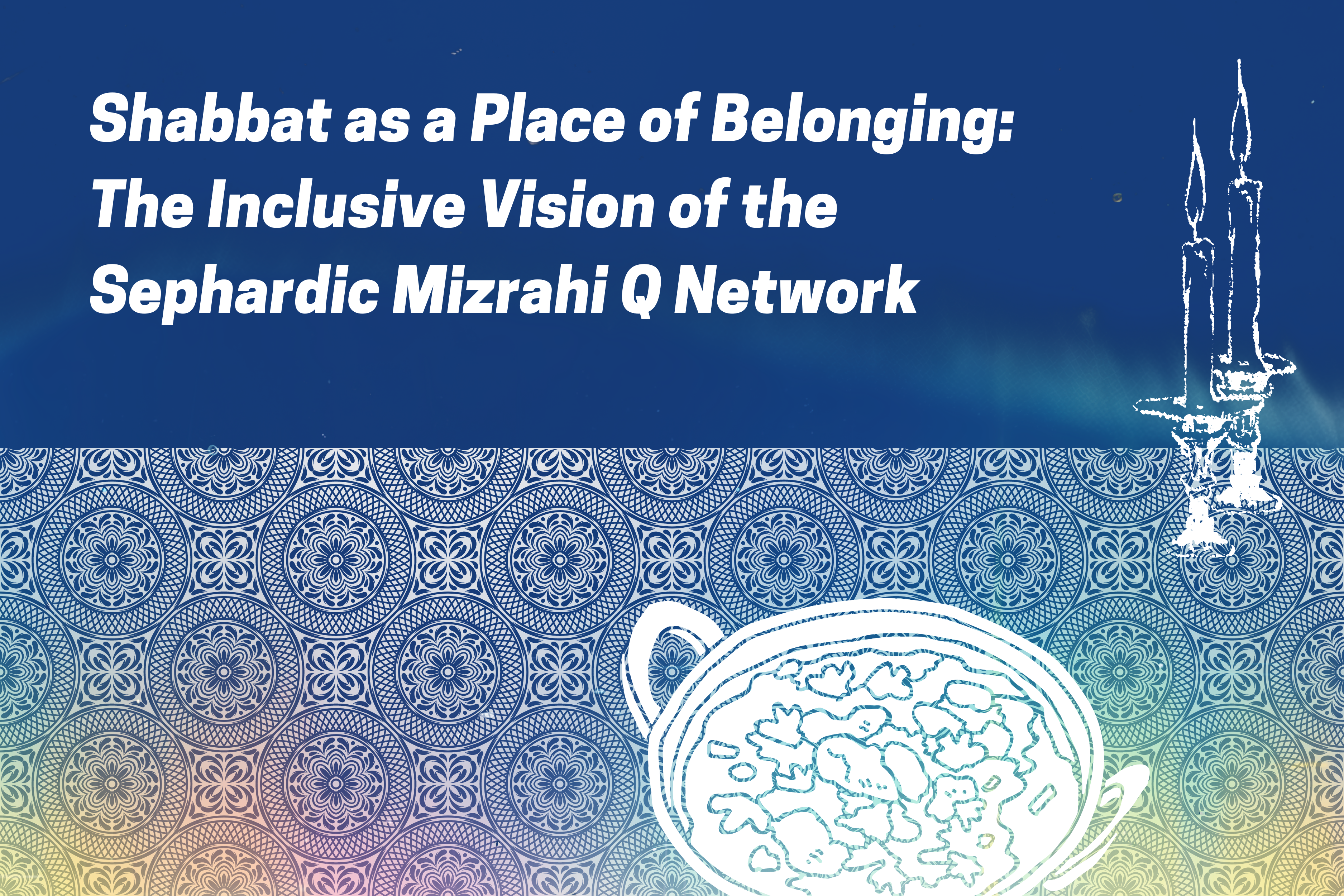
Ruben Shimonov is a founder of the Sephardic Mizrahi Q Network (SMQN), a vibrant organization for LGBTQ+ Sephardic and Mizrahi Jews. Born in Uzbekistan and part of the Bukharian (or Central Asian) Jewish community, Shimonov’s journey to the United States in 1993 also marked the beginning of his mission to help Jews from the Sephardic-Mizrahi diaspora build community and belonging. One of those challenges involved finding a space where fellow queer Sephardic and Mizrahi Jews could show up as their full selves in celebration of their cultural heritages and personal identities.
“Understanding my own distinct and Jewish identity in an American context was at times confusing, because people don’t know a lot about Central Asia in general, much less the Jewish community that is from there,” said Shimonov. “And so that, coupled with Ashkenormativity and some of the ignorance and xenophobia that came in post 9/11, led me to start taking up less space in my identity.” This shrinking away from his identity led to a realization that there was a profound gap in the communal opportunities available to Sephardic and Mizrahi Jews in the United States, especially for those who identified as queer. “There was much need for a movement that sought to create a vibrant, supportive space for folks at the intersection of Mizrahi-Sephardic identities and queer identities,” said Shimonov. And thus, SMQN was born.
During SMQN’s development as a grassroots movement, Shimonov participated in the Jews of Color Initiative’s New York Incubator Program. The Incubator provided him with the opportunity to sharpen leadership and community organizing skills that he could bring to his work with SMQN, and also provided a vibrant cohort of other JoC leaders with their own projects and organizations; these individuals have since become friends and colleagues. “The New York City Incubator program was an immersive experience, and a really special way to meet other creative and passionate people who are also thinking about Jewish community and identity in an expansive way, in a way that really celebrates the true diversity of the Jewish people,” said Shimonov. In the Incubator program, Shimonov was able to articulate in greater detail some of the core values of SMQN, including an ethos of inclusivity and authenticity that informs its flagship Shabbat gatherings.
Shabbat, though deeply resonant for all Jewish communities, holds particular importance for the Greater Sephardi world, which is why SMQN is rooted in building community through Shabbat gatherings. “In the Sephardic experience, Shabbat is when we would come together and really engage in the smells, tastes, sights, and sounds of our distinct North African, Middle Eastern, Central Asian Jewish identities,” explained Shimonov. Because Sephardim have not historically organized religious practices by denomination the way that many Ashkenazim have, Shabbat is by definition a gathering that welcomes individuals from all Jewish backgrounds and practices. For queer individuals, however, access to these open and vibrant spaces have sometimes been limited, Shimonov explains. “SMQN’s Shabbat dinners create an environment where folks do not need to check any part of their identities at the door—where people’s Sephardic and Mizrahi heritage will be embraced, along with their queer identities. The dinners are also a time when we can take ownership of, and reclaim, our connection to Shabbat in a welcoming and affirming space.” In the spirit of Shabbat hospitality, SMQN members are always encouraged to bring loved ones and friends, even if they do not strictly fall under the Sephardic-Mizrahi identity umbrella.
An expansive vision of inclusivity is a cornerstone of SMQN’s mission. “I always want to name that “Sephardic” and “Mizrahi” are fluid, dynamic terms that we make meaning of, and that meaning changes and develops,” said Shimonov. “We want to create a big tent to uplift Jews with deep historical roots and ancestry in parts of Africa, Asia and the Mediterranean. In an American context, that usually means Jewish communities of non-Ashkenazi ancestry.” The diverse backgrounds of SMQN members are built into the Shabbat rituals: each dinner is hosted by a different community member, whose unique background and practices are incorporated into the food, liturgy, and programming of the evening. As such, there is no formal requirement that Shabbat attendees belong to Sephardi and Mizrahi communities, specifically. The ethos of welcoming and inclusivity that SMQN is built upon has made it a space for those whose traditions and backgrounds have been typically underrepresented in American conceptions of Jewish experience. “We have naturally become a space for broader JoC queer identities to find a place of belonging,” said Shimonov.
Shimonov hopes to see a future of SMQN with even more reach, to open the doors even wider for queer Jews of Color with events like Shabbat lunches, Havdalah, and non-Shabbat virtual gatherings. With support from JoCI, SMQN aims to create more opportunities for leadership, growth, and development within the community, ensuring a sustainable and inclusive future for all its members. In January, SMQN held several innovative Shabbat events: a Kavkazi-Iranian Jewish Shabbat dinner followed by a Syrian-Latin American Jewish Shabbat lunch, which opened the organization up to celebrating new modes of cultural practice and cuisine. It also held a virtual Tu Bishvat seder, led by a community member, which explored Mizrahi and Sephardi customs in a queer affirming space. As SMQN continues to grow with support from the Jews of Color Initiative, Shimonov hopes to expand and diversify its Shabbat programming and beyond, and continue highlighting the richness in gathering as queer Jews of Color.


